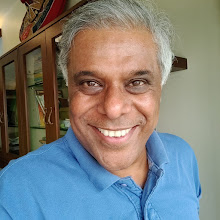GOVIND VIDYARTHI
Born to Kallyani and Paithal in circa 1912 at challayil house, Dharamadam. T K Govindan, very early in his life showed interest in the teachings of Vivekananda. During his schooling he participated in the anti Arrack movement while also studying Hindi under the auspices of the Hindi Prachar Sabha.
Nationalism was not far from this sensitive youth as he and his few friends would read writings of freedom fighters and thinkers. A magazine that he used to read very often was the "Jwala" which was published from distant north India by Ganesh Shankar Vidyarthi.
Govind used to write letters to the editor, and send his own poems. When Ganesh Shankar Vidyarthi died in a ' lathi charge' at the hands of the British, T K Govindan took on Vidyarthi as his surname as a tribute to the legendary freedom fighter.
Simultaneously Govind's spiritual journey continued as he came in touch with Swami Agamanda of the Ramakrishna Math.
His thirst for knowledge and spiritual quest took him to distant Varanasi where he studied Sanskrit at the Kashi Vidya Peeth,while training with 'pehelwaans' at an akhaara..
At some point,as he was completing his education in Varanasi he chose to become a 'Sanyasi'.
By day he studied Sanskrit scriptures and at night he would head for the Muslim quarter in the walled city to learn 'Faarsi' from a Muslim Moulvi.
Just before he took his final vows of Sanyas; when his Guru Bhai told him of his 'duty' to free the Kashi Viswanath Temple from Muslim 'occupation', he saw that his spirituality clashing with institutionalized religion.
He came out of his Ashram and then began his political journey.
After a short while as a congress worker he became a Communist party whole timer.
His 'underground days' since CPI was banned by the British, saw him in various parts of the country. Traveling under the pseudonym 'sharma'.
During his period of stay in Bombay,he came in close contact with progressive writers like Com.Sajjad Zaheer and Com Kaifi Azmi.
It was the period of artists getting together to for the final push against imperial rule on India...
He played an active role in the formation of IPTA (Indian peoples Theatre association,a role he would reaprise years later...in the 1980s after retiring from govt service when IPTA was revitalized and regrouped.)
Amongst other activities,he was hands on involved as a printer of various news papers like People's War, and People's Age.
He continued in the party as Com. P C Joshi's personal assistant till the party split.
Post independence Govind joined the Sangeet Natak Akademi in New Delhi.
He was responsible for archiving the various art forms of India. Photographing, sound recording, and filming in remote tribal areas he ensured that the vanishing art forms found notice.
He got schools opened so that teachers could pass on their form to other people and not limit it to their families only.
Forms which could have gone extinct,exist today because of the tireless efforts of Govind and his team.
He was the director of Jawahar Lal Nehru Manipur dance Academy Imphal and the Kathak Kendra Delhi.
He retired as the Assistant Secretary of Sangeet Natak Akademi.
He expired in Mumbai on 29th of August 2006
Tuesday, 28 August 2007
Subscribe to:
Comments (Atom)
